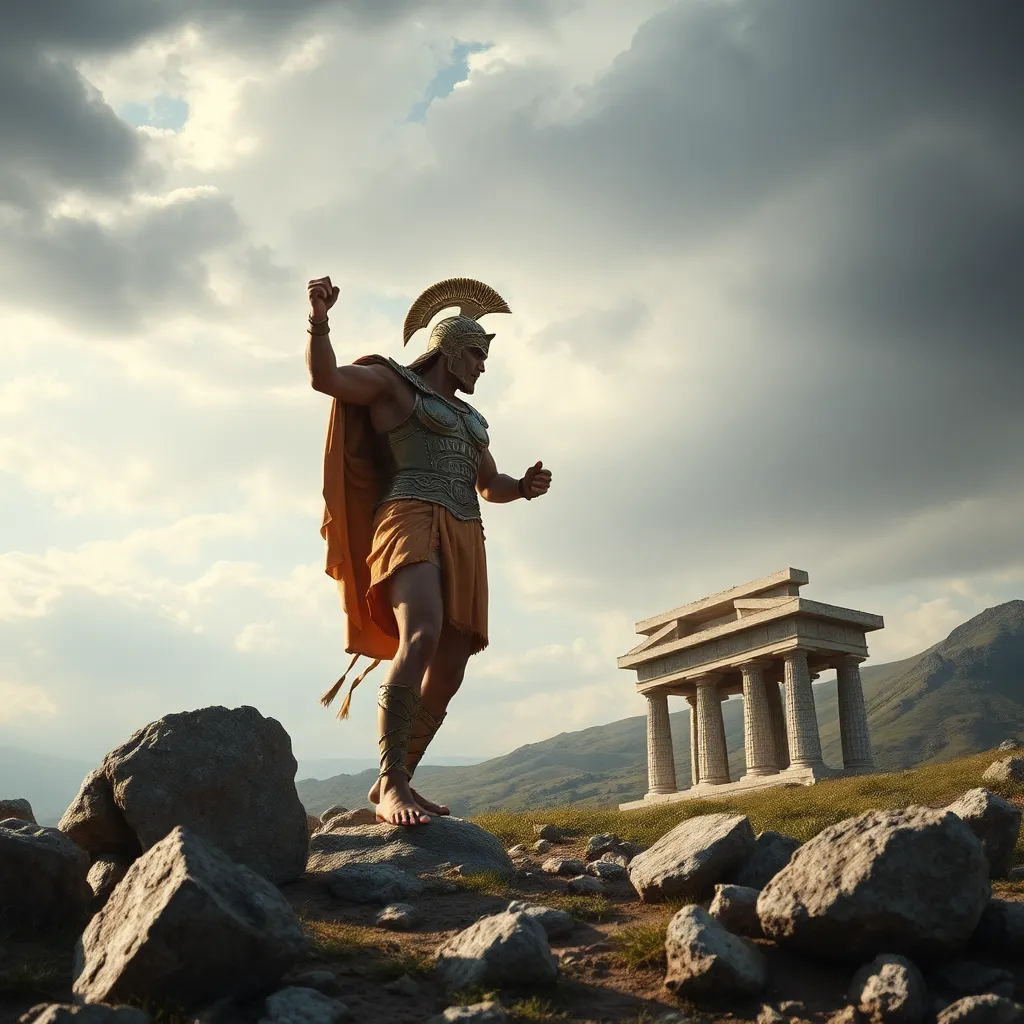Ares and the Nature of Heroism: A Complex Relationship
I. Introduction
Ares, the Greek god of war, is one of the most enigmatic figures in Greek mythology. Often depicted as a fierce and tumultuous deity, he embodies the chaotic and destructive aspects of warfare. This article aims to delve into the intricate relationship between Ares and the concept of heroism, exploring how his persona both aligns with and diverges from the traditional ideals of heroism in ancient Greece.
Heroism, in the context of Greek society, has often been associated with valor, strength, and honor. Yet, Ares presents a more complex narrative, challenging the conventional perceptions of what it means to be a hero. Through this exploration, we will uncover the nuances of Ares’ character and his impact on the understanding of heroism.
II. Ares: The God of War
Ares is frequently characterized by his aggressive demeanor and insatiable thirst for battle. His attributes include:
- Physical Strength: Ares is often depicted as a muscular and powerful figure.
- Weapons: He is typically shown wielding a spear, sword, or shield.
- Symbolism: The vulture and the dog are commonly associated with him, symbolizing death and destruction.
Historically, Ares held a unique position in Greek culture. Unlike other gods, who were revered and celebrated, Ares was often viewed with ambivalence. His embodiment of war resonated with the Greeks, who understood the duality of warfare as both a means of glory and a source of suffering.
In ancient Greek warfare, Ares played a significant role. He was invoked by soldiers seeking strength in battle, yet his presence also served as a reminder of the chaos that war could unleash. Ares represented not the noble aspects of warfare but rather its brutal and indiscriminate nature.
III. Heroism in Ancient Greece
In ancient Greek society, heroism was defined by a blend of personal qualities and actions that exemplified bravery and honor. The heroic ideal included:
- Valor: The courage to face danger and adversity.
- Strength: Physical prowess and skill in battle.
- Honor: Upholding one’s reputation and the values of society.
Key figures of heroism in Greek mythology include:
- Hercules: Known for his incredible strength and twelve labors.
- Achilles: Celebrated for his bravery and martial skills in the Trojan War.
These heroes exemplified the attributes revered in Greek culture, standing in stark contrast to Ares’ chaotic nature.
IV. Ares as an Anti-Hero
Ares’ portrayal in myths and literature often casts him as an anti-hero. Unlike traditional heroes who embody noble values, Ares is characterized by:
- Violence: His actions often result in destruction and suffering.
- Self-Interest: Ares fights for his own glory rather than for a cause.
This contradiction between Ares’ nature and traditional heroism is evident in various myths. For example, during the Trojan War, Ares is depicted as a participant in battles, reveling in the chaos without regard for the consequences of his actions. His involvement often brings further destruction, challenging the ideals of honor and valor that heroes like Achilles strive to uphold.
V. The Duality of War and Heroism
The relationship between war and heroism is fraught with contradictions. While war is often glorified as a path to honor and glory, its brutal reality can lead to devastation and loss of life. Ares embodies this duality:
- Glorification of War: In myths, war is frequently portrayed as noble, with heroes seeking glory on the battlefield.
- Brutal Reality: Ares represents the chaos and destruction that accompany war, reminding us of its harsh consequences.
Ares’ presence shapes the perception of soldiers and heroes, highlighting the complexities of their experiences. While Ares may be invoked for strength in battle, he also serves as a cautionary figure, illustrating the darker aspects of warfare.
VI. Modern Interpretations of Ares and Heroism
In contemporary literature and media, Ares has been reinterpreted in various ways. These modern portrayals often reflect shifting understandings of heroism:
- Complex Characters: Ares is frequently depicted as a multifaceted character, embodying both the allure and the dangers of war.
- Heroism Redefined: Modern narratives often explore themes of morality, sacrifice, and the consequences of violence.
The relevance of Ares’ character in today’s discussions on heroism is significant. As society grapples with the complexities of warfare, Ares serves as a reminder of the duality of human nature and the ongoing struggle between destruction and valor.
VII. The Legacy of Ares in Popular Culture
Ares has made appearances in various forms of popular culture, including films, books, and video games. These portrayals often reflect or reshape the concept of heroism:
- Films: Ares is depicted as a powerful antagonist or complex character in movies, often highlighting the chaos of war.
- Literature: Modern retellings of Greek myths showcase Ares in new lights, exploring his motivations and internal conflicts.
- Video Games: Players encounter Ares in various roles, from a god to be defeated to an ally in battle.
This ongoing dialogue between violence, war, and heroism invites audiences to reconsider their perceptions of these concepts. Ares remains a powerful symbol of the complexities inherent in the human experience.
VIII. Conclusion
The relationship between Ares and heroism is both complex and multifaceted. While Ares embodies the chaos and brutality of war, he also challenges traditional notions of heroism. Understanding the diverse perspectives on heroism is crucial in a world where the implications of violence and conflict continue to resonate.
In reflecting on Ares’ legacy, we are reminded of the importance of examining our values and the meanings we attach to heroism. As we navigate contemporary society, the lessons drawn from Ares’ character remain relevant, urging us to reconcile the dualities of strength and vulnerability, glory and destruction.




